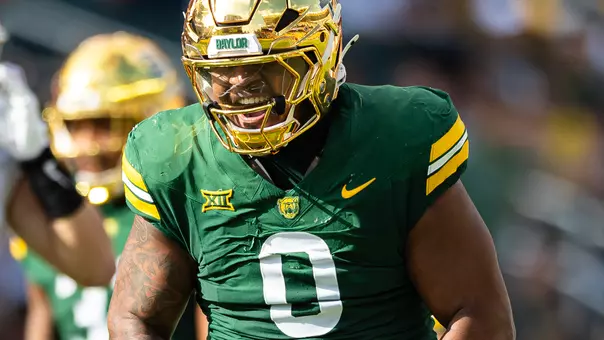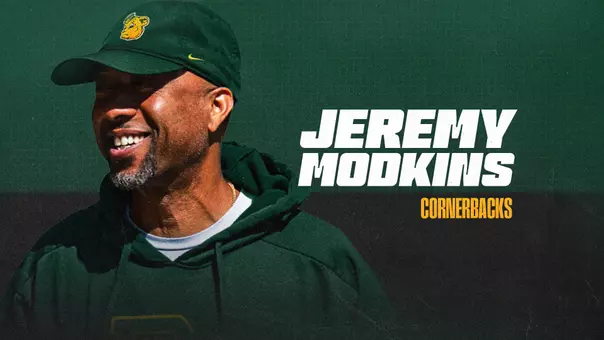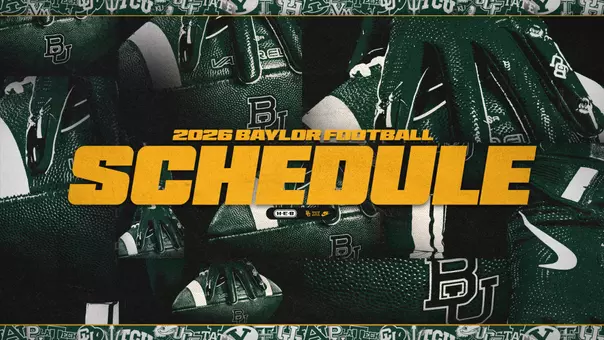Baylor Football Media Day
8/9/2003 12:00:00 AM | Football
Aug. 9, 2003
First-year head coach Guy Morriss and selected players met with the media Saturday during Baylor's annual Football Media Day. Morriss, who is in his first season with the Bears after spending two years as head coach at Kentucky, continues to be pleased with preseason drills. Baylor opens its 2003 campaign Aug. 30 against UAB at Floyd Casey Stadium.
On feeling after first week of practice:
"I feel great; I think we're right on schedule. I was really pleased with the workout we had yesterday. We just keep building day to day.
"The first couple of days, we felt like they were in good straight-line running shape because they've been running all summer. Yesterday was the first sign of them showing us as a staff that they're rounding into some kind of football playing shape. That's different than just running sprints; when you're changing directions and carrying pads and doing football skills, it puts a little more demand on muscles you probably haven't used in a while.
"I was really pleased with the way they pushed through practice yesterday. I just thought it was a really good day."
On timing of first game:
"It's right where it ought to be. I don't want it any sooner; we need the time they've given us to get ready."
On the players' hunger:
"That's good; that's self-motivation. What they have to understand is: what do they have to do to get those wins? Wanting to win is one thing, but harnessing that and learning the discipline that you have to live by and go through - take care of the football, push the envelope from a conditioning standpoint - all that stuff, that's what we're trying to teach them right now. They're starting to understand and starting to buy into all of that."
On importance of special teams:
"It's one-third of your football team. You change more real estate in the kicking game than in any other phase of the game. For us as a staff, it's extremely important. We've got, I think, the best special teams coach in America here at Baylor. (Mark Nelson) does a super job. If you come to watch us workout, the first 15 to 20 minutes of practice every day is devoted to nothing but special teams. We place great emphasis."
On team's response to new coaching staff, new coaching style:
"Well, that's something you don't manufacture, but it's the response I've seen everywhere I've coached to our coaching style. Coach (Gerald) Carr paraphrases it the best when he said, 'Players don't care how much you know until they know how much you care.' And I think our kids are coming to realize that we do care about them, and that we have their best interests at heart. Every decision I make is for the betterment of this football team and them as individuals. I think they understand that, and they're starting to respond to that. I believe they feel confident we can teach them how to learn how to win football games. We're seeing them respond to that; but that's natural, it's not something we've manufactured."
On any surprises:
"We haven't seen anything yet. I'm sure there's going to be a bump in the road here before long. Everything we've dealt with so far happens at every football program in America; it's nothing new. It's how you as a staff handle. If you don't make a big deal out of things, you're players aren't going to take it as a big deal. That's what we do. We preach to our kids on a day-to-day basis: we are not going to worry about anything that we can't control, and we're not going to waste any energy on things we can't do anything about. They've bought into that, and we just go down the road."
On most difficult things in the rebuilding process:
"The toughest to me is between the ears, not only with the football players, but with the alumni, the administration, with the whole picture itself, the university itself. You have to change your mindset. As far as I'm concerned, the standard has gone up. The bar has to be raised, because what we were doing in the past wasn't good enough. The record speaks for itself. So, something has to change, something has to go up. But changes like that, people sometimes don't appreciate it, don't want to be a part of it for whatever reason. You have to go out there and change the mindset of a whole college community, if you will. That's the hardest part."
On whether the coaching staff has sensed any negativity in the community ...
"We haven't yet, but we're undefeated right now. I know how the game is played: as soon as we stub our toe, there's going to be some people e-mailing us and calling us. I've never had anybody come up to my face and tell say anything negative. I get a lot of behind the back stuff, but I don't worry about that.
"If somebody wants to criticize me, I've said this openly, 'Come to the office, sit down and I'll talk with you about it. If you got a complaint about my coaching, I'm willing to listen.'"
On sheltering players from negativity:
"We don't. That's the nature of the beast. Once you step out in that arena, you're public game. You're in the spotlight; that's the by-product of being a college athlete. There's going to be negative along the way, too. You better learn how to deal with it. We don't try to shelter our players at all."
On whether the players have toughened:
"Sure they have. We try to put them in situations where they have to be tough. You line up and run nine on seven, you're going to get your nose bloodied. And if you don't like it, then you don't need to be in football. That develops toughness.
"We talk about being mentally tough all the time. I'm not talking about ... you're walking across campus or wherever, and some little guy says, 'I watched you play the other night. Boy you stink.' So you decide you're going to be a tough guy and beat this kid up. That's not mentally tough. Mentally tough is when we're sitting down here and it's fourth and one at the goal line and you've got somebody against the ropes. You better learn how to deliver the knockout punch. That's mentally tough. It's mentally tough when you're tired and you're sore, getting over here at eight o'clock in the morning and getting under a barbell and working out with weights. Being mentally tough is just getting up and going to class on a daily basis. That's what I'm talking about.
"We're trying to teach these kids not just about football but about life skills. Everybody is going to have some trouble along the way. It's how you handle that problem or whatever it is you're trying to deal with."
On toughness of defensive unit:
"In our first team meeting, I openly challenged our defense. They have got to play better. We're not ever going to win any games around here, we're not ever going to win any championships around here if we don't have a first-rate defense. I've been around a lot of football and had the opportunity to go to two Super Bowls. We got there by playing defense. I believe in defense first, and that's going to be our first priority here is building the defense. If the other guy can't score, he can't beat you. If you can't play defense, you can't win. It's that simple.
"I want the players to know how I feel about it and what we expect from them. We put it squarely on their shoulders. They have to set the example and be the leaders on this team, and they understand that. I think they like that, they relish that challenge because they want to be good. They know they gave up 41 points a game last year. They want to improve on that, be better than that. They're like any other 18-, 19-year-old bunch of kids: they want to win football games, and they want to be the best they can be. Right now, they just need someone to show them how."
On the offense and thin spots:
"There are some craters there, not thin spots. We're thin on the offensive line. We're thin at the quarterback spot. But it is what it is. We're where I thought we'd be; we're right on schedule. The thing we need to do at this point is play some games, find out how our kids are going to respond in a live situation. I told them the other night, 'I'm curious about you guys because there's going to be some adversity. How are we going to react to that adversity? Are we going to go in the tank, or are we going to bow our necks and go through it?'
"I think we have their attention as far as eliminating the stupid mistakes. ... We're OK; we're going to be fine. The key for us is coming out of camp healthy. We've got to have all those guys on the field. If we lose our starting quarterback, we've got big problems."
On quarterback Aaron Karas:
"He's doing well. He's been studying film all summer. He's really become the leader of that group since spring training. He's rounded up those receivers two and three times a week. They've been throwing, running routes, getting their timing together, getting to know each other and all that kind of stuff. He's got a pretty good command of what (offensive coordinator Brent Pease) is trying to teach him. The key is going to be: how much can he learn, and how quick can he learn it? As much as he can handle, we just keep pouring a little bit more on him. The key for him is to just not give him too much. Have him manage the game, and hopefully surround him with 10 other guys that can either protect him or give him some help."
On differences between Karas and Kentucky quarterback Jared Lorenzen:
"Arm strength. From a mental standpoint, Aaron may be picking the system up a little faster than Jared did. But it's hard to match the arm strength of Lorenzen. I've seen Jared make throws Tim Couch couldn't make. And (Couch) was the number one pick in the draft, so that tells you what kind of arm he's got. But in our system you really don't need to have a cannon. We're going to dink and dunk and do some things like that. Our quick game has to be sharp, and then we'll take some shots down the field. If he'll play within himself, go through the proper reads and put the ball in the hands of the proper people, spread it around, we're going to be all right with Aaron."
On judging success at Baylor:
"We want to put a good product on the field. We want our kids to be competitive. We want them to play in the style that I want to see us play - running the ball, being a disciplined football team. I don't want to comment on how many games I think we're going to win and all that. The big key is how we come out of camp. If we can have some success in the non-conference part of our schedule, that would certainly help give our kids a lot of confidence. If you get a bunch of 19-, 20-year-old kids believing in themselves, then who knows where it will go from there."
On recent changes within Baylor Athletics:
"I appreciate Tom Stanton, and I appreciate everything he's done since we've been here to help us be successful. I think Tom, being a Baylor graduate and a person who loves Baylor University, I'm sure it was a very gut-wrenching decision on his part. But he did it for what he thought was the best and betterment of this program and Baylor. Me for one, I respect that. I'm sure that wasn't easy for him, but that's the kind of person Tom is. I respect him for that."



















